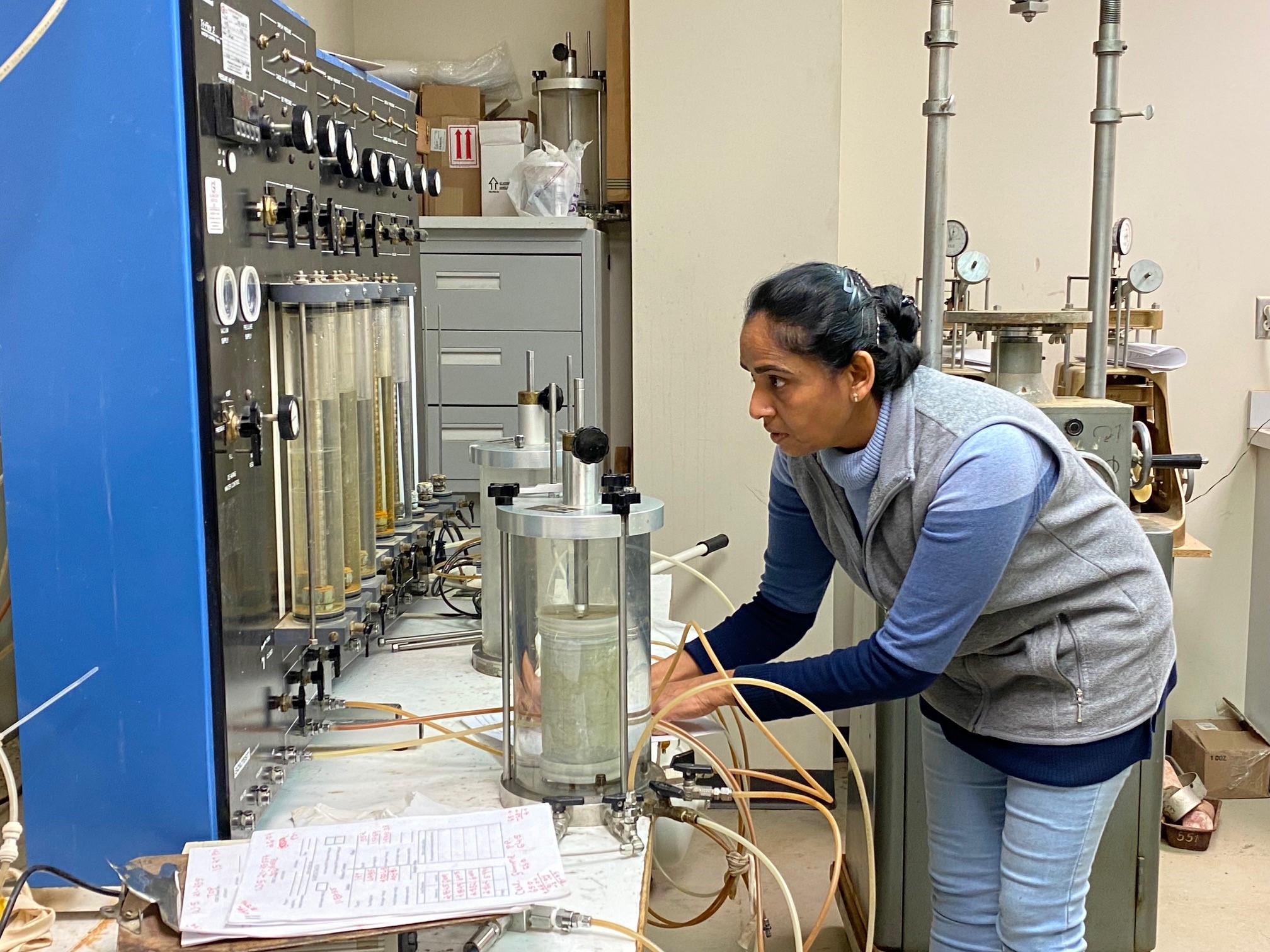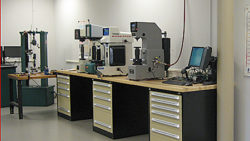Professional Materials Test Lab for Industry-Leading Top Quality Standards
Wiki Article
Precision Testing of Materials for Stamina and Toughness
Accuracy screening of materials for strength and longevity plays an essential role in various sectors, including manufacturing, design, and building and construction. This process entails subjecting different products to extensive analyses to establish their ability to hold up against outside forces and keep their integrity with time.On the planet of materials testing, precision is extremely important. Engineers and researchers count on reliable and accurate data to make educated decisions regarding product selection, style optimization, and item efficiency. By making use of innovative screening strategies and cutting edge devices, experts can examine the toughness and resilience of a variety of materials, such as metals, composites, polymers, and ceramics.
This introduction will offer understandings right into the significance of accuracy screening, the kinds of products typically subjected to testing, the vital parameters for toughness evaluation, and the strategies made use of for durability assessment. It will certainly likewise highlight the applications and benefits of performing accuracy testing in numerous markets.
Significance of Precision Screening
Precision testing is a vital step in assessing the toughness and durability of materials, giving exact and reliable data for notified decision-making. The quality and efficiency of materials play a crucial duty in making sure the safety and longevity of structures and items when it comes to manufacturing and building and construction industries. Performing precision testing is of utmost value to establish whether the products meet the required requirements and requirements.By subjecting products to strenuous screening procedures, engineers and makers can assess their mechanical homes, such as tensile stamina, firmness, and effect resistance. This details enables them to make sure that the materials can endure employed forces and environmental problems without failure or degradation over time. Additionally, accuracy screening assists determine any type of potential defects or weak points in the products, allowing producers to make necessary improvements or alterations to improve performance and integrity.
In addition, accuracy testing gives unbiased and quantifiable data that can be used to make and compare various materials educated decisions concerning their viability for particular applications. When selecting products for critical parts or structures where failure could have serious consequences., this information is especially important.
Types of Products Subjected to Checking
Numerous materials undergo screening for strength and resilience. This screening is essential to make certain that the materials can stand up to the needs of their intended applications and to identify their anticipated lifespan. The sorts of products based on screening are diverse and include steels, polymers, porcelains, composites, and building products.Metals, such as steel and aluminum, are frequently evaluated for their tensile toughness, firmness, and resistance to corrosion. materials test lab. These tests help identify their viability for use in architectural applications, equipment, and numerous industrial processes

Ceramic products, such as porcelain and ceramic tiles, are examined for their compressive toughness, heat resistance, and longevity. These tests ensure that ceramics can endure high temperature levels and rough environments, making them suitable for applications in the building, electrical, and aerospace markets.
Composites, which are materials made from a combination of different components, are subjected to numerous examinations to analyze their mechanical residential properties, such as stamina, effect, and stiffness resistance. Composite materials are widely made use of in markets such as aerospace, vehicle, and sporting activities devices manufacturing.
Building and construction products, including concrete, asphalt, and wood, go through screening to determine their load-bearing capability, durability, and resistance to weathering. These tests are vital in ensuring the safety and security and long life of structures, roadways, and bridges.
Trick Parameters for Stamina Analysis
Materials subjected to screening for strength and durability must be assessed based on essential parameters that accurately examine their capability to withstand environmental conditions and exterior pressures. These parameters play an important function in determining the general efficiency and integrity of a material. Among the essential criteria for strength analysis is the tensile toughness, which gauges a material's capacity to resist pulling pressures without deforming or damaging. An additional vital criterion is the compressive strength, which examines a product's resistance to being or squashing pressed together. Additionally, the flexural stamina is substantial, as it evaluates a material's capacity to endure flexing or turning pressures. In addition, the effect strength is important in analyzing a material's resistance to unexpected, vibrant pressures. Various other parameters that contribute to stamina examination include shear toughness, tiredness stamina, and firmness. Shear stamina gauges a product's useful content capability to stand up to forces that cause gliding or abusing. Tiredness strength reviews a material's resistance to duplicated loading and unloading cycles. Solidity is essential as it gauges a product's resistance to indentation or abrasion. By assessing these key criteria, engineers and researchers can properly evaluate the strength and longevity of products, enabling them to make educated decisions in numerous markets such as aerospace, automotive, construction, and production.

Methods for Resilience Analysis
Durability assessment strategies are important for examining the long-lasting performance and reliability of products. These strategies are critical in determining the capacity of products to stand up to different environmental problems and mechanical stress and anxieties over expanded periods of time.Another technique is cyclic screening, which includes subjecting materials to duplicated loading and discharging cycles. This assists evaluate the product's tiredness resistance and its capability to withstand repeated anxiety without failing. By evaluating the stress-strain action of the material throughout cyclic screening, scientists can identify potential weak points and evaluate the product's longevity.
Moreover, non-destructive testing strategies such as ultrasonic testing and infrared thermography can be employed to evaluate the inner stability and discover any issues or damage in the product. These techniques give useful information regarding the product's toughness without causing any type of damage to it.
Applications and Benefits of Accuracy Testing
Accuracy screening plays an essential duty in evaluating the toughness and longevity of products, making it possible for scientists and engineers to get trusted and exact information for assessing their performance. The applications of accuracy screening are wide-ranging and can be found across various markets, consisting of aerospace, automotive, construction, and production.Among the essential advantages of accuracy screening is its capability to recognize possible weak points or flaws in materials. By subjecting materials to extensive and regulated screening, any flaws or susceptabilities can be found before they bring about devastating failings. This enables suppliers to make required enhancements or changes to improve the general quality and durability of their products.
Precision screening also aids in determining the ideal style and composition of materials. By evaluating different variations and setups, engineers can identify the most suitable products for certain applications. This leads to boosted efficiency, efficiency, and cost-effectiveness in different industries.
Furthermore, accuracy screening supplies important information for the advancement and renovation of products and manufacturing procedures. materials test lab. It permits scientists to acquire a deeper understanding of product habits under different conditions, resulting in the advancement of new products with improved stamina, resilience, and performance features
Conclusion
Finally, accuracy testing plays a vital role in read what he said evaluating the stamina helpful hints and toughness of products. By subjecting different kinds of materials to extensive screening, key parameters for strength analysis can be recognized. Additionally, strategies for sturdiness assessment offer beneficial insights into the efficiency and life expectancy of products. This knowledge makes it possible for markets to make informed decisions and guarantees the growth of durable and trustworthy products.Precision screening is a crucial step in examining the strength and longevity of materials, supplying accurate and trusted information for notified decision-making.Various materials are subjected to testing for toughness and sturdiness. The kinds of materials subjected to testing are varied and consist of steels, polymers, ceramics, composites, and building materials.
By examining the stress-strain action of the material throughout cyclic screening, scientists can identify possible weak points and evaluate the product's durability.
In verdict, precision testing plays an important role in examining the stamina and longevity of products.
Report this wiki page